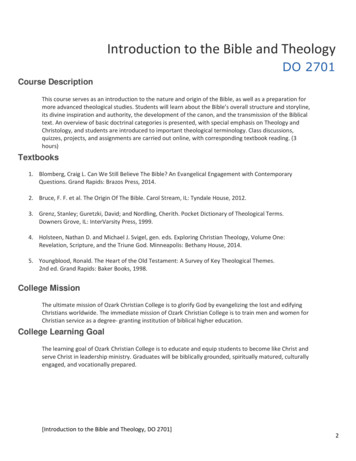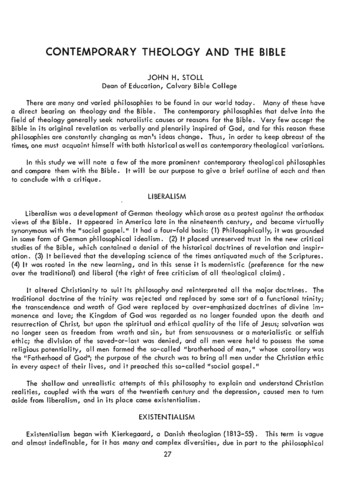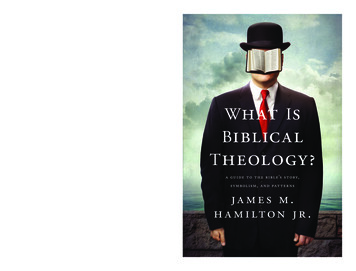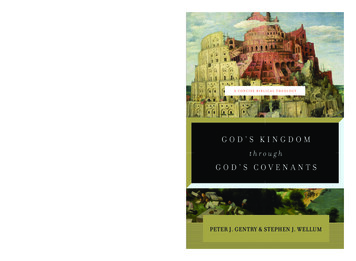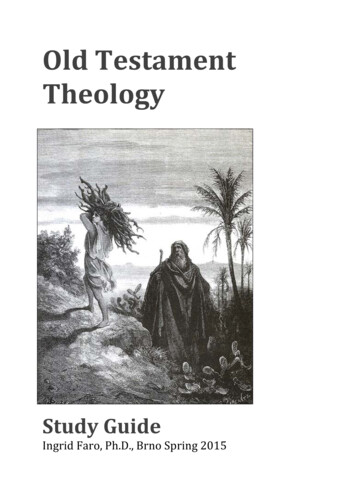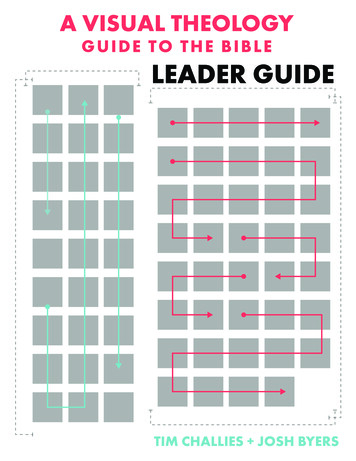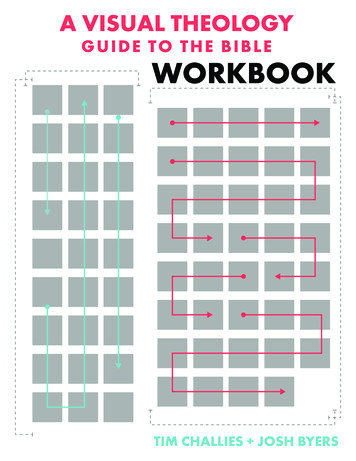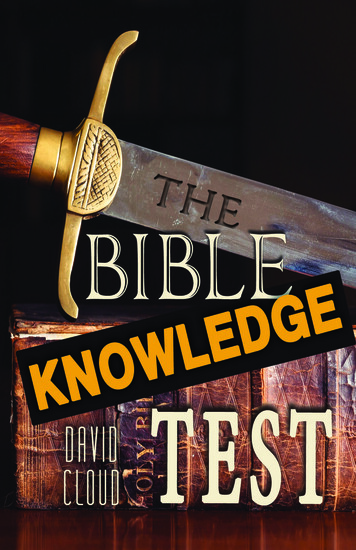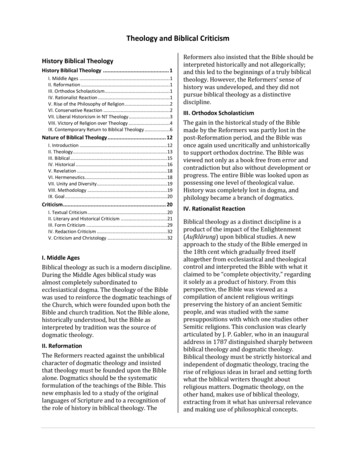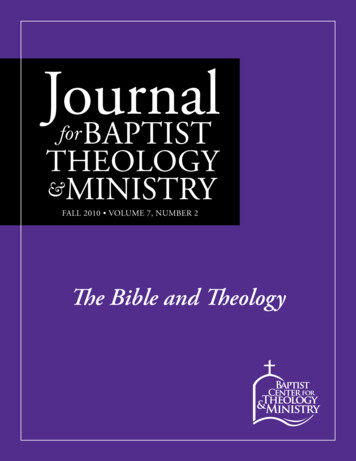
Transcription
FALL 2010 VOLUME 7, NUMBER 2The Bible and Theology
CONTENTSJournal for Baptist Theology and MinistryFALL 2010 Vol. 7, No. 2 The Baptist Center for Theology and MinistryEditor-in-ChiefCharles S. Kelley, Th.D.Associate EditorChristopher J. Black, Ph.D.Assistant EditorSuzanne DavisExecutive Editor &BCTM DirectorSteve W. Lemke, Ph.D.Book Review EditorsPage Brooks, Ph.D.Archie England, Ph.D.Dennis Phelps, Ph.D.Design and Layout EditorsFrank Michael McCormackGary D. MyersThe Bible and TheologyEditorial IntroductionThe Bible and TheologySteve W. Lemke1SECTION 1: THE BIBLE AS FOUNDATIONAL FOR THEOLOGYPhilosophical Perspectives on InerrancyC. Fred Smith5Jesus’ Teaching and Pharisaical JudaismSteven L. Cox14Rome, Bible Translation, and the Oklahoma City Green Bible CollectionThomas P. Johnston38SECTION 2: Key Issues in baptist theologyThe Future of Baptist Theology with a Look at its PastJames Leo Garrett Jr.72Theological Themes in Contemporary HymnodyEd Steele82
CONTENTSReconciling Evangelistic Methods with Worship Models: A Considerationof Apologetic Approaches in the Worship FrameworkGregory Woodward“A Call to Harms”: Is Church Discipline for Today?Jacob A. Taggart93105The Road to Nicea: A Survey of the Regional Differences Influencing theDevelopment of the Doctrine of the TrinityChristopher J. Black120Joe McKeever’s Cartoons131Book Reviews132Reflections141Back Issues142The Baptist Center for Theology and Ministry is a research institute of New Orleans Baptist TheologicalSeminary. The seminary is located at 3939 Gentilly Blvd., New Orleans, LA 70126.BCTM exists to provide theological and ministerial resources to enrich and energize ministry in Baptistchurches. Our goal is to bring together professor and practitioner to produce and apply these resources toBaptist life, polity, and ministry. The mission of the BCTM is to develop, preserve, and communicate thedistinctive theological identity of Baptists.The Journal for Baptist Theology and Ministry is published semiannually by the Baptist Center forTheology and Ministry. Copyright 2010 The Baptist Center for Theology and Ministry, New OrleansBaptist Theological Seminary. All Rights Reserved.Contact BCTM(800) 662-8701, ext. bmissionsVisit the Baptist Center web site for submission guidelines.
JBTMJournal for Baptist Theology and MinistryVol. 7, No. 2 20101EDITORIAL INTRODUCTION:THE BIBLE AND THEOLOGYSteve W. Lemke, Ph.D.Dr. Lemke is Provost, Professor of Philosophy and Ethics, occupying the McFarland Chair of Theology,JBTM Executive Editor, and Director of the Baptist Center for Theology and Ministryat New Orleans Baptist Theological SeminaryNew Orleans, LouisianaEvangelical Systematic Theology begins and ends with Biblical Theology. The Bible is theultimate source of authority for Systematic Theology and is the standard by which allSystematic Theology is measured. Baptists in particular and evangelical Christians in generalbelieve that the Bible is the plumb line by which all theology should be evaluated, not our ownspeculations and conjectures. It is perhaps the burden of conservative theology that it is seldom asinteresting or fascinating as liberal Theology simply because liberal theology places a premium onnovelty and creativity. Liberal theology delights in going directions no one has ever gone before.It is not so with conservative theology. As its name suggests, conservative theology is interestedto “conserve” that what has been given to us in God’s Word. So conservative theology may notbe as innovative as liberal theology, but it is more reliable because it is grounded in God’s Wordrather than in mere human speculation. This Fall 2010 issue of the Journal for Baptist Theologyand Ministry addresses the doctrine of Scripture as it informs theology.The first section of this issue of the Journal considers how the Bible is foundational fortheology. In this section, C. Fred Smith (Associate Professor of Theology and Biblical Studies atLiberty Baptist Theological Seminary) argues for the inerrancy of Scripture from the perspectiveof logic and philosophy. Steven L. Cox (Research Professor of New Testament and Greek atMid-America Baptist Theological Seminary) discusses the relationship of Jesus’ teaching topharisaical Judaism. Thomas P. Johnston (Associate Professor of Evangelism at MidwesternBaptist Theological Seminary) contrasts Catholic and Protestant approaches to the availability ofBibles to laypersons, the use of vernacular translations, the proper translation of the Bible, andthe use of the Bible in theology. Johnston notes how these differences in Catholic and Protestantapproaches to the Bible become visible in the Green Bible Collection in Oklahoma City.The second section of this issue of the Journal addresses “Key Issues in Theology for theChurch.” James Leo Garrett, Jr. (Distinguished Professor Emeritus of Historical and SystematicTheology at Southwestern Baptist Theological Seminary), one of the giants in Southern BaptistTheology, contributes an article on the past and future of Baptist theology. This article wasoriginally presented by Dr. Garrett at the special event sponsored by the Theological and
JBTMSteve Lemke2Historical Studies Division at NOBTS. The next two articles concern the application of theologyto Christian worship. Ed Steele (Associate Professor of Music in Leavell College of New OrleansBaptist Theological Seminary) contributes an article on “Theological Themes in ContemporaryHymnody,” and Greg Woodward (Assistant Professor of Conducting and Division Chair of theChurch Music Ministries Division of New Orleans Baptist Theological Seminary) contributes anarticle on reconciling evangelistic methods with worship models, particularly taking into accountpopular approaches to Apologetics. The last two articles in this section address two additionaltheological issues of relevance to the church. The article by Jacob A. Taggart (a bank vice-president,president of a Christian school, deacon, and recent M.A. in Theological Studies graduate ofLiberty Baptist Theological Seminary) issues “A Call to Harms” concerning the lack of churchdiscipline. Finally, Christopher J. Black (Research Assistant to the Provost and Associate Editorof the Journal for Baptist Theology and Ministry at New Orleans Baptist Theological Seminary)contributes an article on how regional differences shaped the development of the doctrine of theTrinity. We also commend the good selection of book reviews that we offer our readers in thisissue.The editorial board of JBTM apologizes to our readers for the long delay in our completingthis Fall 2010 issue of the Journal. A number of factors have put us behind our publishingschedule. However, we are hopeful that in addition to this Fall 2010 issue of JBTM, we anticipatefollowing it with the Spring 2011 issue within just a few weeks. The theme of the Spring 2011issue of the JBTM is “Arminians, Calvinists, and Baptists on the Doctrine of Salvation.” Itfeatures a paper presented by Dr. Matt Pinson, President of Free Will Baptist Bible College,at a Spring 2011 special event sponsored by the Baptist Center for Theology and Ministry.Dr. Pinson’s paper is entitled, “Thomas Grantham’s Theology of Atonement and Justification.”Grantham was a General Baptist who was somewhat Arminian in theology. The interaction ofthree discussion panel members with Dr. Pinson is included. This issue will also include severalother papers discussing the doctrine of salvation from Calvinistic and Baptist perspectives. Wehope this upcoming issue will add further clarity to the continuing discussions about the doctrineof salvation in the SBC. Thank you for your continued support and interest in the Journal forBaptist Theology and Ministry!
JBTM3A forum for Baptists to dialogueabout how best to fulfill God’scalling in our lives.These are challenging times in the Southern Baptist Convention, buttimes full of opportunity. As we move ahead together, this site willcontinue to advocate our historic, biblical beliefs as Baptists aboutour Savior, Jesus Christ, and His church.SBC Today exists to restore unity in the convention around biblicaldiscipleship and our historic Baptist distinctives and to give a voice towhat we believe to be the heart of the great majority of Southern Baptists.SBC Today casts a positive vision for the future of the Southern BaptistConvention, one rooted in our historic and biblical identity.Join the conversation at www.sbctoday.com
SECTION 1THE BIBLEAS FOUNDATIONALFOR THEOLOGYAll Scripture is given by inspiration of God,and is profitable for doctrine, for reproof, forcorrection, for instruction in righteousness,that the man of God may be complete,thoroughly equipped for every good work.2 TIMOTHY 3:16-17
JBTMThe Bible and Theology5PHILOSOPHICAL PERSPECTIVESON INERRANCYC. Fred Smith, Ph.D.Dr. Smith is Associate Professor of Theology and Biblical Studiesat Liberty Baptist Theological SeminaryLynchburg, VirginiaIntroductionBehind every broad movement within Christianity lies an understanding of what the Bible isand how it functions in the community of faith. Scripture is determinative for where onestands on a host of doctrinal and theological questions. This especially is true for evangelicalswho have defended the Trinity, the virgin birth of Christ, the Resurrection and the bodily returnof Christ on the basis that they are revealed in the Bible. The commitment to Scripture as God’srevelation has kept evangelicals on solid ground for these and a host of other doctrines. Indeed,as Francis Schaeffer said, “Evangelicalism is not consistently evangelical unless there is a linedrawn between those who take a full view of Scripture and those who do not.”1 Maintaining acommitment to inerrancy must be a priority if evangelicalism is to continue to uphold truth.In the nineteenth century, the nature of Scripture was examined extensively by John Bascom2 andWilliam Sanday.3 After this, little attention was given to Scripture by philosophers of religion until the1930s, when their focus turned to the examination of language itself. A survey of the literature in thefield over the past two or three generations makes this clear. Emil Brunner in his book The Philosophy ofReligion from the Standpoint of Protestant Orthodoxy4 gave revelation a central place, but rejected the ideaof seeing revelation in terms a divine book, something fixed, timeless, and enscripturated. For Brunner,revelation had to do with an existential encounter between the believer and God. Edgar Brightman,1Francis Schaeffer, “Form and Freedom in the Church” in J. D. Douglas, Let the Earth Hear His Voice (Minneapolis,MN: World Wide, 1974), 364-65; cited in Richard Lovelace, “Inerrancy: Some Historical Perspectives” in Inerrancyand Common Sense, ed. Roger Nicole and J. Ramsey Michaels, 15-47 (Grand Rapids: Baker, 1980), 18.2John Bascom, A Philosophy of Religion or the Rational Grounds of Religious Belief (New York: G. P.Putnam’s Sons, 1876), 203-312.3William Sanday, Inspiration: Eight Lectures on the Early History and Origin of the Doctrine of BiblicalInspiration, Bampton Lectures (New York: Longmans, Green, 1893).4Emil Brunner, The Philosophy of Religion from the Standpoint of Protestant Orthodoxy, trans. A. J. D.Farrer and Bertram Lee Woolf (New York: Charles Scribner’s Sons, 1937), 151.
JBTMC. Fred Smith6writing in 1940, briefly treated revelation as a way of knowing God, but did not seriously consider thepossibility that God had revealed himself in Scripture.5 In 1954 Daniel Jay Bronstein and Harold M.Schulweis did not discuss Scripture in their Approaches to Philosophy of Religion: A Book of Readings 6 atall. John Wilson in his Language and Christian Belief 7 discussed religious language but not the Bible.Geddes MacGregor treated the way one makes assertions about religious subjects in his Introduction toReligious Philosophy 8 but did not consider the nature of the Bible. Paul Van Buren, in his 1963 book TheSecular Meaning of the Gospel Based on an Analysis of Its Language 9 never mentioned the subject, thoughhe devoted a chapter to religious language. Stuart Brown, a few years later, treated religion as somethingof an epistemological problem dealing with religious language and its validity from the standpoint oflinguistic analysis.10 James McClendon and James Smith treated religious language without dealingwith the nature of Scripture.11 In 1988, Norman Geisler and Winfred Corduan;12 and in 1993, BrianDavies,13 omitted inerrancy from their books; even though each devoted large discussions on religiouslanguage and its validity.These twentieth century writers were responding to A. J. Ayer, whose Language Truth and Logic 14became the standard work on logical positivism. Ayer asserted that only two classes of statements aremeaningful: those that are empirically verifiable and those that are analytically true—true by logicalor mathematical necessity. If Ayer is right, any kind of religious truth claim would be, quite simply,meaningless. If that is the case, then contending for biblical inerrancy is meaningless also. Therefore,philosophers of religion confined themselves to defending the right to make truthful—and therefore5Edgar Sheffield Brightman, A Philosophy of Religion (New York: Prentice-Hall, 1940), 172-78.6Daniel Jay Bronstein and Harold M. Schulweis, Approaches to Philosophy of Religion: A Book of Readings(New York: Prentice Hall, 1954).7John Wilson, Language and Christian Belief (New York: St. Martin’s, 1958).8Geddes MacGregor, Introduction to Religious Philosophy (Boston: Houghton Mifflin, 1959).9Paul Van Buren, The Secular Meaning of the Gospel Based on an Analysis of Its Language (New York:Macmillan, 1963).10Stuart C. Brown, Do Religious Claims Make Sense? (London: SCM, 1969).11James William McClendon, Jr. and James M. Smith, Understanding Religious Convictions (NotreDame, IN: University of Notre Dame Press, 1975).12Norman Geisler and Winfred Corduan, Philosophy of Religion, 2d ed. (Grand Rapids: Baker, 1988),211-91.13Brian Davies, Introduction to the Philosophy of Religion (Oxford: Oxford University Press, 1993), 20-31.14A. J. Ayer, Language Truth and Logic (New York: Oxford University Press), 1936.
JBTMC. Fred Smith7authoritative—claims about religion. Primarily, inerrancy has been left to evidentialist apologetics andtheologians.Inerrancy is usually defended on the basis of evidence, historical, textual, and archaeological,which has been shown to support the truth claims of the Bible. However, an approach that is morephilosophically driven offers possibilities for the apologist and needs to be given serious consideration.Approaches to Defending ScriptureIf apologists want to claim that the Bible is inerrant and be justified in doing so, the questionnecessarily arises as to what method or approach is best for this. The doctrine of Scripture isusually approached inductively or deductively. Using the inductive method, people seek to amassevidence that the Bible is or is not inerrant, or they begin with certain premises that guaranteewhichever conclusion they wish to prove. Using the deductive method to defend inerrancyusually begins with the doctrine of God. One might call it (in parallel to a popular Christologicalmodel) “the doctrine of Scripture from above.” The inductive method, on the other hand, beginswith the phenomena of the text itself and may be called “the doctrine of Scripture from below.”Inductive MethodExamples of the inductive method abound. In 1888, Basil Manly sought “to build up an argumentby successive steps” to prove biblical inerrancy.15 More recently, Josh McDowell has defended thehistoricity of biblical events and has demonstrated the accuracy of Bible prophesies.16 Both authorsuse the inductive method because, like detectives, they amass specific facts and use them to draw theconclusion that Scripture is inerrant. Stanley Anderson has also defended inerrancy this way. In hisarticle “Verbal Inspiration Inductively Considered”17 he amassed evidence from history, archaeology,Bible prophecy, science, and human psychology to demonstrate that the Bible is inerrant. Buildinghis doctrine “from below,” he examined some seventy-nine Scripture passages in an eight-page article.Anderson early on turns to deduction in his argument asserting the following syllogism: All Scriptureis inspired of God; each word is a part of Scripture; therefore each word is inspired of God (15).There are weaknesses in formulating one’s doctrine of Scripture from below. The inductivemethod, at best, can only establish the high probability of the Bible as an inerrant document. It15Basil Manly, Jr., The Bible Doctrine of Inspiration Explained and Vindicated (New York: Armstrong andSon, 1888), 108, cf. 130-175.16Josh McDowell, Evidence that Demands A Verdict (San Bernadino, CA: Campus Crusade for Christ, 1972).17Stanley E. Anderson, “Verbal Inspiration Inductively Considered,” in Evangelicals and Inerrancy, ed.Ronald Youngblood (Nashville: Thomas Nelson, 1984), 13-21. This paper originally was read before theEvangelical Theological Society meeting in 1955.
JBTMC. Fred Smith8can establish the probability at a very high level, but for some, this is still not enough. In addition,the inductive method often is used by those who hold to a doctrine of authority that falls shortof inerrancy.18 James D. G. Dunn has said that attention to the phenomena of Scripture itselfwill not get one to a doctrine of inerrancy.19 Attention to the phenomena will not compel one todisbelieve inerrancy either, but the fact remains that the inductive method leads to an impasse.One’s conclusions from the phenomena of the text are, in fact, largely determined by what one bringsto it. D. A. Carson has shown that it is not the claims of Scripture which count against its truthfulnessbut rather “a certain interpretation of the phenomena of the text.” 20 The Enlightenment, which exaltedboth reason and the inductive method, beginning from Descartes and Bacon, has had an impact on theway Scripture is seen.21 Bacon’s inductive method especially led to the separation between “truth” and“religion,” with religion relegated to the area of private opinion only.22 Approached inductively, and withthe presuppositions of the Enlightenment regarding authority, the supernatural, and the necessity forreason and coherence, it is little wonder that many moderns conclude that the Bible is not inerrant.Deductive ApproachA deductive approach, building a doctrine of Scripture from above, is much better. Here,one begins with God and works to the phenomena of the text, and so long as the text itself doesnot directly invalidate one’s basic presuppositions, the argument is on strong ground. Workingdeductively guarantees the results if the argument is valid, and if the premises are true. What isnecessary then is a proper doctrine of God.Presuppositions Necessary for aDeductive Approach to ScriptureArguing for Scripture from above requires beginning with a proper understanding of God.18D. A. Carson, “Recent Developments in the Doctrine of Scripture,” in Hermeneutics, Authority andCanon, ed. D. A. Carson and John D. Woodbridge (Grand Rapids: Academie, 1986), 23.19Roger Nicole, “The Inspiration and Authority of Scripture: J. D. G. Dunn versus B. B. Warfield(continued),” in Churchman vol. 98, no. 3 (1984): 210-11; quoted in Carson, 20.20Carson, 23.21John D. Woodbridge, “Some Misconceptions of the Impact of the Enlightenment on the Doctrineof Scripture,” in Hermeneutics, Authority and Canon, ed. D. A. Carson and John D. Woodbridge (GrandRapids: Academie, 1986), 241-70.22Norman Geisler, “Inductivism, Materialism and Rationalism: Bacon, Hobbes, and Spinoza,” in NormanGeisler, ed., Biblical Errancy: An Analysis of its Philosophical Roots (Grand Rapids: Zondervan, 1981), 11-22.
JBTMC. Fred Smith9The way we frames our doctrine of God will determine the way we approach revelation.23 If ourdoctrine of God is adequate, our view of revelation will be also.An argument from above must be based on certain assumptions about God, His nature,power, and moral attributes. Even the statement “if Scripture is divinely revealed, then it isinerrant” makes a moral assumption about the nature of God—that He does not lie. WhenJohn Warwick Montgomery argues that inerrancy and inspiration are inseparable, he implicitlyargues that a certain understanding of who God is and how He acts is necessary for the Bible tobe inerrant.24 God must be truthful, and He must be powerful enough to guarantee the results.Richard Swinburne has said directly, “A good God who knows everything, will not lie to us.”25What, then, is essential in a doctrine of God which is adequate for inerrancy? First is theidea that God is sovereign. God is capable of so moving in history and in people’s lives as toproduce and guarantee a written revelation. Sanday recognized this in 1893 when he spoke ofthe “providential disposition of events” which gave fuller meaning to biblical prophecies.26 AGod who is subject to the whims of human free will is not a God who can guarantee an inerrantrevelation of himself. Many who argue against inerrancy do so on the basis of an overdevelopedunderstanding of human free will and an underdeveloped understanding of divine sovereignty.Second, one must presuppose that God is interested in revealing Himself. There must be areason for the revelation. Richard Swinburne has argued that if there is an all-wise, all-powerfulGod who desires that men be holy, then it is not unreasonable to suppose that He has revealedHimself and His purposes.27Third is the matter of God’s moral nature. God must be moral enough to want to reveal thetruth about Himself. In addition, He must care enough about truth itself to want to tell the truthin everything. God’s character is on the line in revelation. The God who reveals himself, if He isa truth-telling God, must tell the truth in everything, including science and history.This may appear to some as if merely to choose which traits of God to emphasize, in anarbitrary manner, so as to guarantee the right outcome. There are, however, ways to confirm thisdirection. One way is found in the ontological argument for the existence of God. This argument,dating back to Anselm, has received new life in recent years in the form of Thomas Morris’s23Bascom, 204.24Montgomery, 61.25Swinburne, 85.26Sanday, 404.27Swinburne, 69-72.
JBTMC. Fred Smith10perfect being theology.28 God is the sum total of all of His perfections. He is the personificationof perfection in every way, including existence.Assuming that this argument is sound actually goes a long way toward defending inerrancy. If Godis a perfect being and the sum of all His perfections, He must be both powerful and moral. What Hereveals then has the guarantee of being perfect, in the sense of being exactly what He wanted and ofbeing true. The God of Anselm and of Morris is powerful enough and good enough to guarantee this.Alvin Plantinga’s defence of belief in God as “properly basic” helps. He says “a person is entirelywithin his epistemic rights, entirely rational, in believing in God even if he has no argument forthis belief, and does not believe it on the basis of any other beliefs he holds.”29 Believers in Godhave an immediate awareness of the truth of His existence apart from any justification for it.30 Theirbelief is properly basic to other beliefs. Such faith may arise from a sense of God’s presence, from anawareness of the created universe, or from a liberating sense of being forgiven for one’s sins.31 Suchfaith entirely is biblical since the Bible itself never attempts to argue for the existence of God.32The God in whom we may properly believe may be shown to be no different from the Godwho is revealed in the Bible, that is, the God of classical theism. This is implicit in Plantinga’sargument and is assumed also by his forebears, John Calvin and Abraham Kuyper.How does this help us get to an inerrant Scripture? Plantinga’s epistemology is congruentwith presuppositional apologetics. Properly basic beliefs function as presuppositions, as thefoundation for other beliefs. If belief in the God who is described in Scripture is properly basic,then belief that He has revealed Himself in that Scripture may be seen as properly basic as well.Logically, it works as follows:1) Belief in the God of classical theism is properly basic.2) This God is powerful enough to guarantee any outcome He chooses.28Thomas V. Morris, Our Idea of God: An Introduction to Philosophical Theology (Notre Dame, IN:University of Notre Dame Press, 1991).29Alvin C. Plantinga, “The Reformed Objection to Natural Theology,” in Michael Peterson, WilliamHasker, Bruce Reichenbach, and David Basinger, eds., Philosophy of Religion: Selected Readings (New York:Oxford University Press, 1996), 313.30Alvin C. Plantinga, “On Reformed Epistemology,” in Michael Peterson, William Hasker, BruceReichenbach, and David Basinger, eds., Philosophy of Religion: Selected Readings (New York: OxfordUniversity Press, 1996), 332.31Plantinga, “Belief in God,” 99-100.32Plantinga, “Reformed Objection,” 311.
JBTMC. Fred Smith113) This God is moral enough to be always truthful.4) Any revelation that has its source in this God will be exactly what He chooses to reveal(from 2).5) Any revelation which has its source in this God will be absolutely true (from 3).6) The Bible gives evidence of having its source in this God, by the way it assumes Hisexistence, and reveals intentions and purposes consistent with such a God (from 4).7) One may begin from the God of classical theism as a properly basic belief and accept theBible as His revelation (from 6).8) The Bible is the inerrant word of God (from 4, 5, and 7).These propositions show how one may begin with the idea of a God who is a perfect beingand who also wishes to reveal himself and who is foundational in Plantinga’s sense of the term.This doctrine of God, coupled with the idea that He has revealed Himself in Scripture, entailsinerrancy.This requires, however, some knowledge of the Bible. The Bible, to be inerrant, must be a bookwhich would reveal that kind of God. It is at this point that one should go to the phenomena ofthe text, to argue for inerrancy “from below.” One does this not as the first step but as the last,with one’s presuppositions disclosed and defensible. No purely logical argument, however wellfounded, can stand alone on a matter like this. While its premises may guarantee its conclusions,its premises must be tested by the evidence.Richard Swinburne developed a two-pronged test of content for Scripture. First it must provide“information necessary for our deepest well-being.”33 This information consists of moral truths, andtruths about God’s nature and actions to help one apply these moral truths, and some details of theafterlife as encouragement. Second, it must be true. Swinburne means it must be true according to thecorrespondence theory of truth: it must correspond to the real world. He says there must be nothingthat is evidently false, nothing that is provable as false,34 and its claims regarding future events mustcome true.35 Swinburne also cites external evidence such as the character of the messenger and hismiracle-working powers.36 Here he has in mind Jesus as one who validates the message.One question remains: why would God reveal Himself in something as fragile as a book? Hecould have inscribed the entire message in stone, not just the Law of Moses. If all of the Bible33Swinburne, 85.34Ibid., 86.35Ibid., 87.36Ibid., 93-94.
JBTMC. Fred Smith12were inscribed on a mountainside, or on one mountain on each continent, or if it were to appearmiraculously in golden letters in the sky, one day every twenty years, it would be clear that thiswas a message from God and would cause people to pay more attention.However, Swinburne says that it is reasonable that God, wanting to give people free choice,would locate His revelation in such a place that one would need to seek it and yet that it wouldbe “available and discoverable.”37 This argument is not so compelling, but it is worth considering.A stronger argument lies in the way God works in history. Miraculous events are rare. Godusually works through the normal channels of everyday life. This is part of the hiddenness ofGod. In light of this, is it any wonder that His revelation comes in the form of a book, one thatlooks like any other, just paper and ink?A Model for InspirationA model for how revelation happens must be consistent with the understanding of God that wedelineated here and consistent with inerrancy. Some want to locate revelation only in the historicalevents. The written text is secondary revelation only, an interpretation of God’s action in history.Others locate revelation both in the historical event and in the encounter between the modern readerand the text. Revelation happens when God speaks to the individual reader. This is the neo-orthodoxapproach. Those who hold to the “dynamic” view of inspiration want to locate revelation in the periodof reflection before the writing begins, when God inspires the “ideas” that make up Scripture. All ofthese are efforts to come to grips with the phenomena of the text, the critical problems, and even theexperience of reading. All of these views express a part of the truth, but they all fall short.If the Bible is God’s word, and if it is inerrant, then the text itself must be a revelation of God.Any understanding of revelation that does not include the text is a deficient understanding ofrevelation. The text and the process behind its coming into existence are part of the sovereigntyof God in guaranteeing the truth of His revelation. Thus revelation is both process and result,both the historical event and the text that describes it.Here is a model consistent with this claim. The production of the Bible followed
The Bible and Theology. CONTENTS The Baptist center for Theology and Ministry is a research institute of New Orleans Baptist Theological Seminary. The seminary is located at 3939 Gentilly Blvd., New Orleans, LA 70126. BCTM exists to provide theological and ministe

